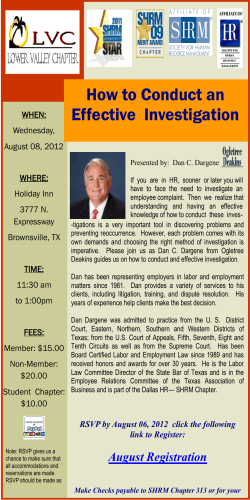
Ryan Wechsler - Florida State University College of Law
DAN MARKEL’S PREMATURE DEATH CEMENTS HIS UNCOMPROMISING LEGACY RYAN WECHSLER* “You know, they say to never be late with a cup of coffee in your hand.” Two seconds prior, I stumbled through the door of Professor Dan Markel’s Criminal Procedure: Adjudication class, thermos in hand, one or two minutes late. The door to our classroom was noisy, and the audience was limited to about ten, so all eyes pounced on me as I abruptly entered the room. Under Markel’s scrutiny, I immediately blurted my excuse: “traffic.” Although my excuse was true, Markel’s immediate and witty rebuttal proved it to be illegitimate—I should have skipped making coffee. Brilliantly assertive, brutally honest, and tenaciously disciplined, Markel wore these attributes like a potent cologne. At the Florida State University College of Law where he taught, Professor Markel’s name carried a mystique that excited some students, terrified others, but marveled all. Before even meeting him, you would have heard the stories of Markel calling on the inattentive student who surfed the internet, interrogating the unprepared student who lied about completing the reading assignment, and dismissing the disruptive student who, from the back row, too loudly discussed the weekend’s football game with a classmate. Effectively, Markel’s expectations were disclosed before he ever handed out a syllabus, but those students who evaded campus gossip and were unaware of Markel’s demands quickly found out—and hopefully not the hard way. To be fair, Markel’s dominant classroom command befell his brightest and most diligent students as well. I, admittedly, was not his brightest, but because of my passionate interest in criminal law, I was diligent in both classes I took with Markel, and I frequently contributed to classroom discussion. Typically, the unwritten rule in law school is this: law students who voluntarily raise their hand to participate get a “pass,” of sorts. More specifically, law professors usually restrict the harshness of their logical attacks on students’ volunteered comments in order to encourage voluntary classroom participation. Some variation of this rule was followed by every professor I took in law school except one, Professor Markel, who adamantly abandoned it. Moreover, because Markel’s curriculum and teaching style were largely theoretical, his classroom discussions were prevalent and combative. When I was really on my game, and on days when my intuition was particularly strong, I could withstand two or three verbal * J.D., 2014, Florida State University College of Law. 14 FLORIDA STATE UNIVERSITY LAW REVIEW [Vol. 42:13 exchanges before Markel would stump me. But it was never about “winning” or “losing” when you went up against Markel; in fact, you were never against Markel whatsoever. It was a mutual learning experience, and that is what made his teaching style so fun and effective. Whenever I contributed, Markel would carefully consider my input (a brief delay in his rebuttal meant I might be on to something) and then meticulously unravel it. He treated students’ insights like pieces of scholarship to which he was obligated to critically respond. No one has ever unpacked my thought process in the way that Markel was so instinctively able to do. When I reflect on the times I went back and forth with Markel, I realize that they were the greatest moments of learning that I ever experienced. What I learned goes far beyond the intricacies of criminal law; Markel taught me how to think critically at a level I never had before, and that is a lesson Markel gave me that I will carry for the rest of my life. Still, there was much more to Dan Markel than the militant professor and scrupulous scholar, and I am fortunate to have known the human being beneath the renowned academic. The first of two dinners that I had at Markel’s house revealed the contrast of who Markel was at home in comparison to who he was in the classroom. Markel invited the students in his Sentencing Law and Policy seminar, in which I was enrolled, to his home for dinner. I remember my curiosity as to what his home would be like. I boyishly (and presumptively) imagined his living room hosting exquisite furniture, his shelf space packed with scholarship, and his walls showcasing fine art and framed accolades. I am embarrassed to admit that I expected more of an intimidating library than a welcoming “home,” but my prediction nevertheless proved remarkably inaccurate. In fact, Markel’s home highlighted the family man in Dan Markel. Beanbag chairs and other children’s furniture lined his living room, toys littered his floor, and drawings and colorings decorated his walls. And whichever shelves were not flooded with coloring books and children’s stories, pictures of Markel’s family—primarily his children—were proudly displayed. Indeed, the makings of Markel’s home broadcasted not only that Markel was a playful, loving, and devoted father, but that fatherhood was by far the most important aspect of his life. Furthermore, through the two classes I took with Markel, along with our countless interactions outside of the classroom, Markel and I developed a rather close relationship during my final two years of law school. I am proud to write that Markel became more than my professor; Markel was my friend and mentor. A personal honor both then and now, Markel rendered a special interest in me as a student and offered tangible assistance with my aspiring career in criminal defense. The impact Markel made on me is illuminated through many recollections I have of our relationship, but one final anecdote 2014] MARKEL’S UNCOMPROMISING LEGACY 15 best encapsulates who Dan Markel was to me. Alongside my coauthor and while juggling a heavy course load, I worked tirelessly for three months researching, writing, and editing a lengthy legal comment that I hoped to publish. Of course, I proudly boasted of the endeavor to Markel, but I maintained serious doubt that the paper would actually materialize into a publishable work. Months after finally completing the paper and soliciting it for publication, a specialty journal e-mailed me an offer for publication. Reading the offer (which my co-author and I readily accepted) was, by far, the proudest moment I ever had as a student; and I remember the thought that instantaneously popped into my mind as I exhilaratingly leaped from my chair: “I have to tell Markel!” Whenever I contemplate what Markel meant to me, I reflect on that moment and how I subsequently darted to campus that day to look for him. He was someone I immensely admired and who I constantly strived to impress. It is for these reasons that I made plans with Markel to keep in touch as my career developed. Tragically, those plans were prematurely taken from our relationship. But what has not been taken is my desire to impress Markel, because I still feel that precise motivation, intuitively and as strong as ever before. From that standpoint, I am but one example of how Markel’s influence on the world has not lost momentum. No, Dan Markel is not merely a memory—his imprint is here to stay. 16 FLORIDA STATE UNIVERSITY LAW REVIEW [Vol. 42:13
© Copyright 2025









